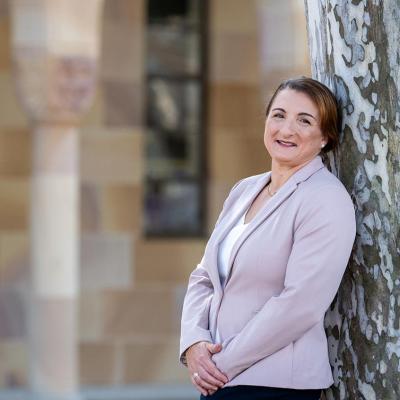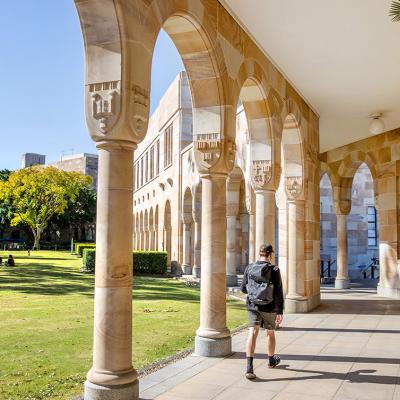Figuring out how to balance uni and life can be stressful.
You might be planning on working, parenting or caregiving while you’re studying, or you may need to travel longer distances to get to class. Whatever is the case, at UQ, we understand that everyone has a life outside of uni – and that your studies need to work in tandem with it.
We want to help you realise your university and career dreams, without having to sacrifice your other important commitments. That’s why we offer our students a level of flexibility with their studies to help with maintaining a uni/life balance.
We also understand that, for a variety of reasons, not everyone arrives at university on the same path, which is why there are several ways to get into your program of choice at UQ.
From flexible course delivery to part-time study options, here’s how UQ will support you to study while balancing all the other aspects of your life.
While you’re reading this article, keep in mind that we call degrees ‘programs’ at UQ, and when we refer to ‘courses’, we mean the individual subjects that make up your overall program.
Alternative pathways to university
Finish high school. Get an ATAR. Get into uni.
While this is the most popular of all the university pathways, it’s certainly not the only one.
Some people don’t quite get the ATAR they need, or they didn’t take the required subjects in high school to gain entry to their program of choice. Others work for a few years, or many years, before beginning university studies. Sometimes life gets in the way. Sometimes you just need or want to prioritise other things before study. Not everyone accesses tertiary education the same way, and that’s why there are multiple pathways to university.
At UQ, it’s possible to secure a place in your program of choice, even if you don’t receive the ATAR you need (or one at all) or don’t meet the entry requirements. You may need to take an extra year to get there, but there’s still a pathway for you.
There are options to complete bridging courses or a bridging program, sit a Special Tertiary Admission Test (STAT) or enrol in a more accessible program and then upgrade to your preferred one. You can explore all the available pathways to find the one that best fits your circumstances.
Recognition of prior learning
If you’ve previously completed any TAFE, university or International Baccalaureate studies, you may be able to get university course credits. This means UQ may recognise your previous studies so you don’t have to repeat similar courses and can graduate sooner. Alternatively, you may be exempt from certain introductory courses and be able to take a more advanced course instead, to further your knowledge.
Find out more about credit and exemptions
University course credits allow you to accelerate graduation and ensure that you get the most out of your studies – after all, you want to be learning new things and developing new skills.

Part-time university studies
Not everyone is able to study full time. At UQ, you can study some programs part time, which is great news for anyone wondering how to balance university and work, or university and other life commitments.
A full-time study load is classified as 6 units or more per semester. Each course is generally 2 units each (though this can differ for specific courses), so you’d need to be taking 3 courses or more per semester to be classified as a full-time student.
A part-time study load is fewer than 6 units (typically 3 courses) per semester. So, you’d only need to take 1 or 2 courses per semester if you wanted to study part time. It’s generally recommended that you spend around 10 hours studying (including contact time – lectures, tutorials, workshops, etc.) per week, for every 2 units (1 course). That means, if you take 2 courses per semester, you should be committing about 20 hours a week to university. This is far less intensive than a typical full-time study load, which can require 40 hours or more of study per week.
The amount of time you spend studying per week will differ depending on your program and learning style. You may find some courses more difficult than others and will therefore need to dedicate more time to them.
Studying part time means that it will take you longer to graduate, but it can be very beneficial if you need to balance other commitments with university. You can find out whether the program you wish to study is offered part time at UQ by searching for it on our Find a program page and taking note of the program duration.
If you're an international student with a student visa, you're expected to finish your program by the end date listed on your Confirmation of Enrolment (CoE). This usually means taking 8 units per semester.
Thinking about taking a lighter course load? Changes could affect your visa. Reach out to your faculty for advice and approval before making any changes.
Online learning options
At UQ, we offer a range of flexible university courses, depending on the program you’re studying. When viewing your courses, make sure you check the ‘location’ and ‘attendance mode’. There are two primary modes of delivery for a course: in-person and external.
- In-person attendance indicates an in-person course that may incorporate some aspects of online delivery (e.g. online lectures, options for online tutorials, online assessment) but requires students to engage in in-person learning and/or assessment at a UQ campus or other location at some point.
- External attendance is delivered entirely online.

Deferring or taking a break from studies
Sometimes you may need to take a temporary break from your studies, and that’s OK. There are 2 key ways we offer this at UQ.
Taking a gap year before beginning your studies
Once offered a position in your program of choice, you can choose to defer the commencement of your university studies for up to a year. Year 12 students sometimes choose this option so they can have a break from study between high school and university while still securing a place in their preferred program.
Find out more about deferring your studies.
You cannot defer mid-year offers at UQ.
Taking time off during your studies
Sometimes unexpected things happen and maintaining a uni/life balance just isn't plausible for a time. You may need to take time off from study while you concentrate on your personal life. You can choose to interrupt your university studies once you have already commenced your program. This just means taking a temporary break from study. Depending on the program you’re studying, you may need to request special permission to take an interruption.
Find out more about interrupting your studies.
The bottom line
At UQ, we want you to feel confident managing a consistent uni/life balance so you can excel at your studies, without taking away from the other important things in your life.
If you have questions about how UQ can support you during your studies, contact our friendly future students team or if you would like to see how UQ’s facilities can offer even more convenience and flexibility during your time at uni, take a virtual campus tour.





